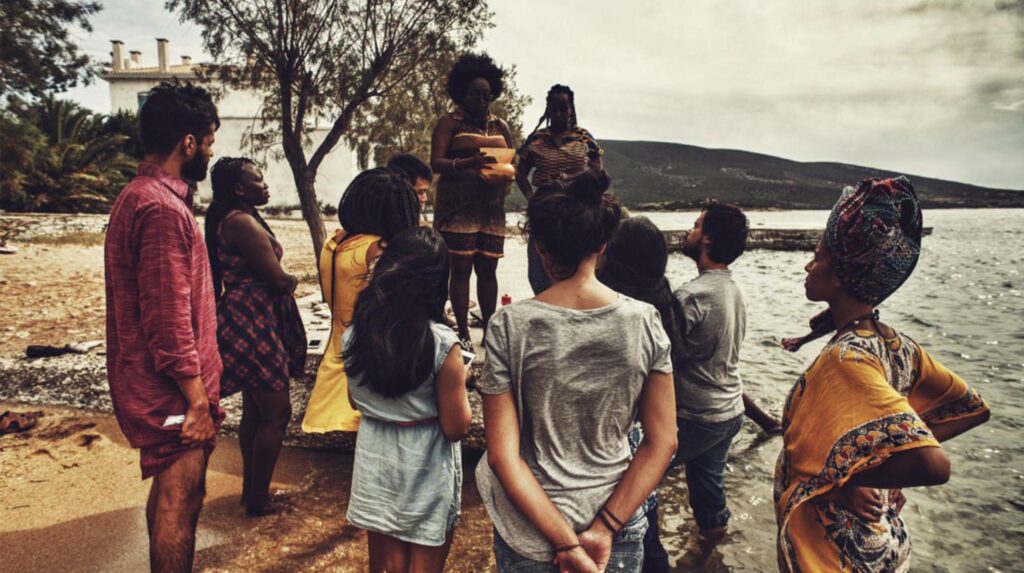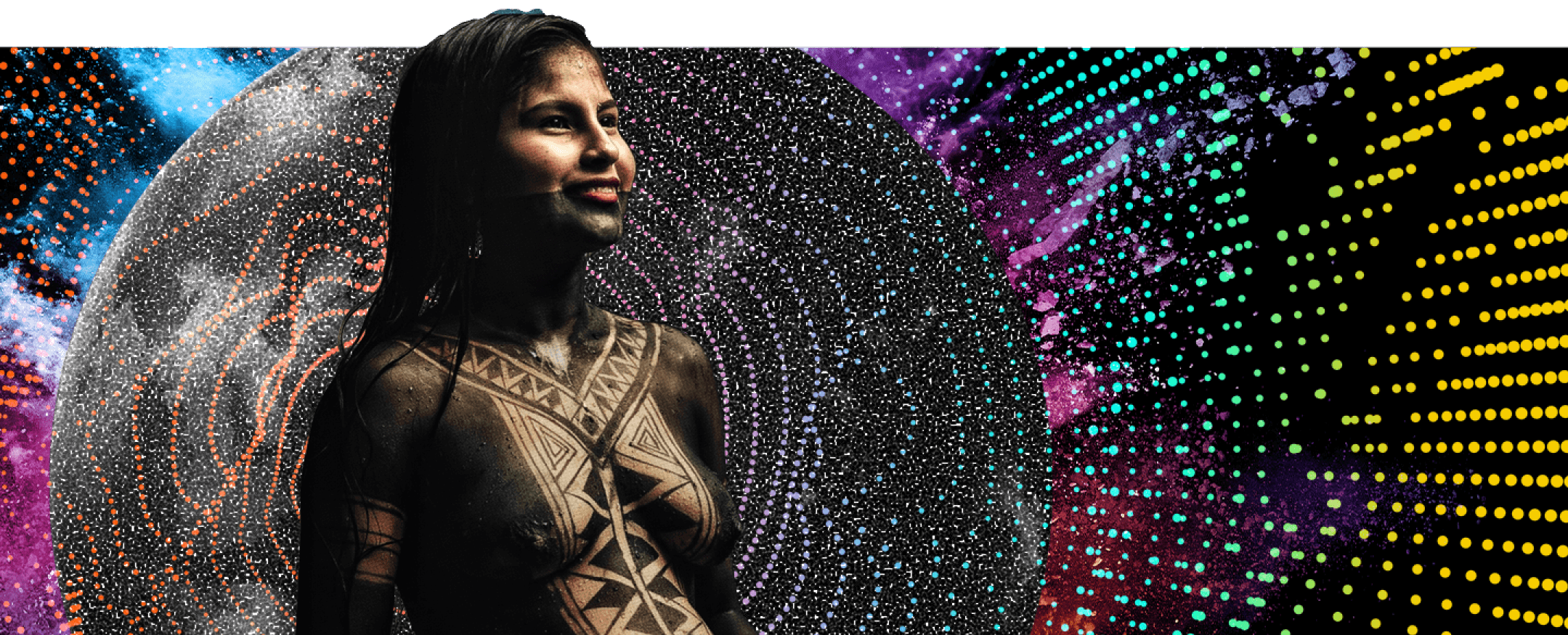
Our mission is to change
the cultural narratives
that create and justify ecological breakdown, extraction, and structural inequality.
Culture Hack Labs (CHL) is a not-for-profit consultancy that supports organizations, social movements and activists to create cultural interventions for systems change.
Our process is based on an integrated set of tools and techniques to track, research and intervene in cultural narratives. We capture and map large volumes of social data using the Culture Hack Platform. We then analyze the networks, language, and deep logics to develop insights and content to evolve culture.


CHL was born out of a decade of research and development in narrative-led culture change work via The Rules, an activist collective focused on addressing the root causes of inequality through narrative and cultural interventions.
We operate as a decentralized network of researchers, movement leaders, social scientists, strategists, artists, communications & political strategists, and technologists.
We come together to create narrative interventions that cut to the heart of the dominant culture.

FAQ
The following are frequently asked questions or “ethical considerations” that we contemplate and grapple with at CHL as a collective, and that have been asked of us before. We are in a constant dialectical process with the messiness of these entanglements and considerations.

What are the ethical implications of using other people’s data? Isn’t this the same type of behavior that we condemn groups like Cambridge Analytica?
CHL uses openly available data inputs. Unlike Cambridge Analytica and other big data organizations, we are not buying other people’s data nor are we using the data for commercial purposes. We are using public data as one avenue of research input in order to understand broad social, cultural trends for particular narrative landscapes. We are not “profiting” from this data or working with any commercial groups that are using this information to make more money, sell products, etc. We are working with social movements and not-for-profit organizations so they can better understand the issue terrain in which they work and become more “contextually relevant” in their desire to expand public discourse on critical social issues.
How can you do research on an issue or movement that you are “not a part of”?
The role of Culture Hack Labs is to study cultural currents and societal trends. Sometimes this work is part of broader cultural intervention work that we are a part of. For example, the Cura Da Terra research and campaign was created in partnership with various Indigenous communities in the Brazilian Amazon.
In the case of the Transforming the Transition (TtT) research, CHL was commissioned to study a particular moment in US culture by examining both online and offline discourse in a particular historical moment (June 2020) where polarizing narratives were coming to a heightened state in the run up to the US political election. It was not our intent to study Black Lives Matter or the Covid pandemic; rather those happened to be the two dominant conversations at the time of analysis.
As often is the case with studying cultural moments, we do not assemble a team based on their issue area expertise (as we often don’t know what issues will emerge) rather, we put together the team best suited to undertake the type of research and analysis we focus on at CHL. We are a small cohort of individuals who live and work across many countries and geographies with backgrounds in big data analysis, memetics, and cognitive linguistics, who also share a post-capitalist ideological lens that can work on a wide range of issue areas.
When research landscapes emerge, we do not claim to represent the communities that are most active in these narrative terrains. For example, for TtT we do not claim to represent either the scientific community vis-a-vis Covid or Black Lives Matter as a movement. Rather, we are assessing the contours of the narrative in order to make recommendations to activists, researchers, organizers and others interested in refining social justice narratives to be more effective, inclusive and challenging to the dominant neoliberal paradigm.
We also recognize that analyzing these frames and narrative environments is studying just a slice of these moments and movements, and therefore, our related analysis and recommendations are limited accordingly.
As with all research methodologies, there are limitations to our approach (e.g. we are limited to whom we know or who responds or our biases and ways of communication). As such, we openly and publicly share our research findings, and are available for discussion and refinement of our findings if and when relevant groups contact us.
Do you have the right to critique social justice movements?
When we offer analysis or suggestions for more “syntropic framing” (i.e. frames that transcend “us versus them” binaries and evolve narrative landscapes into spaces of healing, restoration and transformation) it is not to undermine a movement or its allies, or to insinuate that there are not existing syntropic frames already being adopted, but rather, to offer insights into how to deepen public support for the movement.
We recognize the right and importance for marginalized and oppressed communities to express their demands and desires for social change in the ways which make sense for their respective communities. We acknowledge the critical nature of their work and struggles.
For example, we are explicit in our ideology in both our written report for Transforming the Transition (TtT) and our webinars in that we stand in solidarity with BLM and the demands of the movement. BLM has been instrumental in not only shifting the discourse around white supremacy, police brutality and racialized hierarchies, but has lifted all social justice struggles. We acknowledge the deep lineage this work stems from, including the abolitionist, Civil Rights, anti-colonialist, Pan-African movements and other black liberation struggles. Their sacrifice, courage and solidarity has contributed to the liberation of all beings.
Although we have allies within many of the movements we support and relationships with individual organizers, we recognize that any individual does not speak for an entire movement. They may also not identify with every aspect of the broader movement. We are available for discussion from diverse factions within movements as it helps us learn and grow how to be more rigorous in our work and in deeper solidarity with these struggles.
When you suggest syntropic frames are you saying there is a “right way” to do framing?
A syntropic frame such as “our healing is bound together” can be an important contribution in an ecosystem of interventions because it creates pathways and bridges for new allies and different types of discourse within the movement. We do not believe there is a “right way” or a master frame, but that multiple approaches for both critique and inclusion are important for the expansion of a movement’s goals. Our subjective aim is to increase compassion, altruism, healing and interbeing in social realms so there
We do not believe the ideal long-term outcome for marginalized communities is inclusion within the capitalist system, but rather, bioregional and community sovereignty (including food, land, water, energy, cultural, economic, medicine and political sovereignty) which requires the dismantling of the existing system and creating life-centric models. Although we support the short-term desire to meet immediate material needs (and have organized and campaigned on issues such as universal basic income) we do not believe more inclusion in the capitalist system is the end goal or will ultimately address the root causes that brought us to the current moment. If we are critical of short-term tactics, it is because we believe that means often determine ends. This is an implicit bias in our work and recommendations.
If we criticize the institutional policy of a movement or even a state, that does not mean we are against that institution or people who identify with that particular cause; rather, we are using our lens and experience in narrative work to help social change practitioners play more “contextually relevant” roles in our cultural evolution.
An example of a syntropic approach that we admire is the Defend the Sacred Alliance (DSA) when it states, “When Life wins, there are no losers”. This is a non-zero sum statement that is rooted in solidarity with all Life while transcending traditional binaries. It also pits growth-based extraction against life-centric systems without increasing polarization. The DSA is a global community of Indigenous elders and diaspora activists focused on sacred activism and are well positioned to tell this particular story of standing with the living planet; afterall the medium is a critical part of the message.
Similarly, when studying regressive cultural movements or narratives such as the Alt-Right or the Q Anon community, our aim is to offer suggestions and insights to help progressive groups counter these socially destructive narratives. We are not neutral scientific bystanders in culture but rather political actors attempting to use insights from big data analysis, discourse analysis, cognitive linguistics, memetics, political strategy, community organizing and other disciplines to shift the broader cultural landscape to one this is life-centric and focused on post-capitalist, post-colonialist, post-patriarchal, anti-racist alternatives. We don’t believe we are “objectively right”; we have a subjective point-of-view informed by values that we make explicit.
How do your values affect your research?
As a research organization led by diaspora activists, largely from BIPOC communities and marginalized peoples, we work in service of the global justice movement. Our aim is to better understand the dominant culture (which is largely Eurocentric, patriarchal, racist, extractive, etc.) to offer insights and leverage points to deepen the possibility of adjacent possible futures steeped in values of solidarity, empathy, generosity, interbeing, cooperation and symbiosis with the living planet.
Although we research a diverse set of social issues from immigrant rights to Indigenous rights to racial justice and gender justice, our team is not “representative” of any of these issues.
When we are commissioned by social movements to support their work, we embed within their organizational structures and steep ourselves in the relevant cultural, historical and contextual knowledge. We try to approach all of our work with a disposition of “epistemic humility”. We continuously contemplate the complexity of identity politics and try to grapple with how they affect any given situation.
As other groups like research institutes, think tanks and universities are pulling similar data, we believe that we must also use the available information and tools to shift the cultural and narrative landscape in favor of syntropic frames and narratives that contribute to cultures of responsibility, healing, transformation and restoration. We take seriously the “right to research” and internally discuss how we can be of best service to progressive & radical movements, communities and narratives. We offer our research openly and freely available to social movements and activists. And we are available for discussion and support for political movements we stand in solidarity with.
If you are a post-capitalist organization, why do you take funds? And whom do you take funds from?
As with everyone else in the world, we are enmeshed in the global economic operating system of neoliberal capitalism. This means that the individual members of the CHL collective require some form of income. We did not create CHL to “make money” or maximize profits. As such, we set up CHL as a not-for-profit organization. We are responsible to the members of our team and the nested communities in which we are enmeshed. Many of our team members still work as volunteers in solidarity with the work of CHL. We keep a constant and open dialogue amongst members of the collective on financial needs and requirements.
Our budget in 2020 was roughly USD $300K. In 2021 it will roughly be $450K. We have a modular research and strategy team of about eight people and a technology development team of about seven people.
We only apply for grants from progressive & radical foundations and donors, ideally for organizational funding rather than limited project funding. We do not take money from governments or corporations.
When we are hired as advisors or consultants, we only work with organizations and social movements with whom we are aligned in values and objectives.
For every NGO or foundation project that is brought in, we provide research and advisory services to one social movement at no cost. Our commissioned research such as Transforming the Transition is offered for free to movements and allies, including webinars and follow up advisory/strategy sessions.
